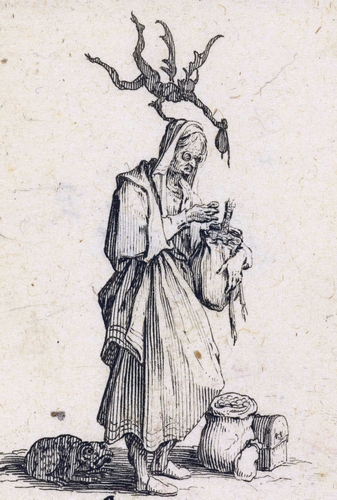 - by Father Joseph F Beckman
- by Father Joseph F Beckman - by Father Joseph F Beckman
- by Father Joseph F Beckman
A priest was once called to the deathbed of a rich merchant who had been away from the Church for many years. Speaking bluntly, but kindly, of the man's serious spiritual state the priest began to take hope when the patient looked longingly at a beautiful silver crucifix held before him.
The hope was short-lived, however; the dying man whispered, "What do you think the cross is worth?"
This little story illustrates better than we might imagine the effects of the capital sin covetousness or avarice.
Saint Paul in his First Epistle to Timothy says, "Covetousness is the root of all evils, and some in their eagerness to get rich have strayed from the faith and have involved themselves in many troubles" (I Timothy 6:10).
The story is famous of Abraham Lincoln walking along a street in Springfield, Illinois, one day with two of his young sons, who were both crying.
"What seems to be the trouble with the boys, Mr. Lincoln?" a passer-by asked.
"Same thing that's wrong with the rest of the world," Lincoln said; "I've got three walnuts and each boy wants two."
Covetousness always has been, is and always will be one of man's serious problems in this world, for covetousness is one of the capital sins, one of the basic evil tendencies to which our fallen nature is prone.
Covetousness, or avarice, is a disordered love of earthly goods, usually of money. It is natural for man to desire earthly goods. He needs them, in moderation, to exist.
But our love of temporal goods becomes disordered if it is not guided by a reasonable end. If we love money for itself, as an end in itself rather than as a means to normal living, we are guilty of avarice. Occasionally we read of a beggar or rag-picker or someone else living in extreme destitution. Then after he dies, he is discovered to have a horde of money hidden away somewhere. Certainly, this is the sign of a mind sick with avarice if not with a real mental illness.
Our disordered love of riches may lie in the manner in which we seek them. If we are so eager to acquire possessions that we use dishonest means to attain them we are guilty of covetousness. If we neglect our duties, harm our health or injure the health or rights of others, we are guilty of covetousness.
Our disordered love may lie in an unwillingness to use properly the goods we now have. Perhaps we seldom or never give alms to someone poorer than we. In some families the wife and children go in need, or they get what they need only after a humiliating battle. Or perhaps the husband is so devoted to work that he seldom if ever spends any time with his family. A disordered love of money may be at the root of such an evil.
Covetousness is not generally a vice of the young. Many times the victim of avarice is an old maid or a bachelor who, without dependents, fears for the future.
"Do not be anxious," Our Lord advises. "Look at the birds of the air. . . . See how the lilies of the field grow. . . . Seek first the kingdom of God and his justice, and all these things [food, clothing] shall be given you besides" (Matthew 6).
Covetousness is a serious evil for many reasons. It is sinful in itself and often leads to many other sins: theft, fraud, lying, uncharitableness, broken contracts and perjury.
Covetousness is a serious obstacle to holiness. "He who seeks after riches," Saint Philip Neri used to say, "will never become a saint." The heart that is overcrowded with worldly desires has little place for God. The person who would prefer, for even a short time, the richest of earthly possessions instead of God's love is foolish indeed.
We must not belittle prudent provision for the future or intelligent thrift, but we must be careful that inordinate love of money does not become a passion with us. We should handle worldly possessions as we will wish we had handled them the day after our death.
"All we can hold in our dead hands," says an ancient Sanskrit proverb, "is what we have given away."
Saint John Chrysostom says, "The rich man is not one who is in possession of much, but one who gives much."
Saint Francis de Sales in his Introduction to the Devout Life gives excellent advice to the avaricious person. "If you are inclined to avarice," he says, "often think of the foolishness of this sin, which makes us the slaves of what was created only to serve us,
"Reflect that at death we shall have to part with all our possessions, and leave them in the hands of someone who may squander them or to whom they may prove a source of ruin and damnation."
In the words of our Master Himself, from His Sermon on the Mount, "Do not lay up for yourself treasures on earth, where rust and moth consume, and where thieves break in and steal; but lay up for yourselves treasures in heaven, where neither rust nor moth consumes, nor thieves break in and steal.
"For where thy treasure is, there thy heart also will be" (Matthew 6:19-21).
- from the book Seven Roads to Hell and 'Ave Maria' magazine